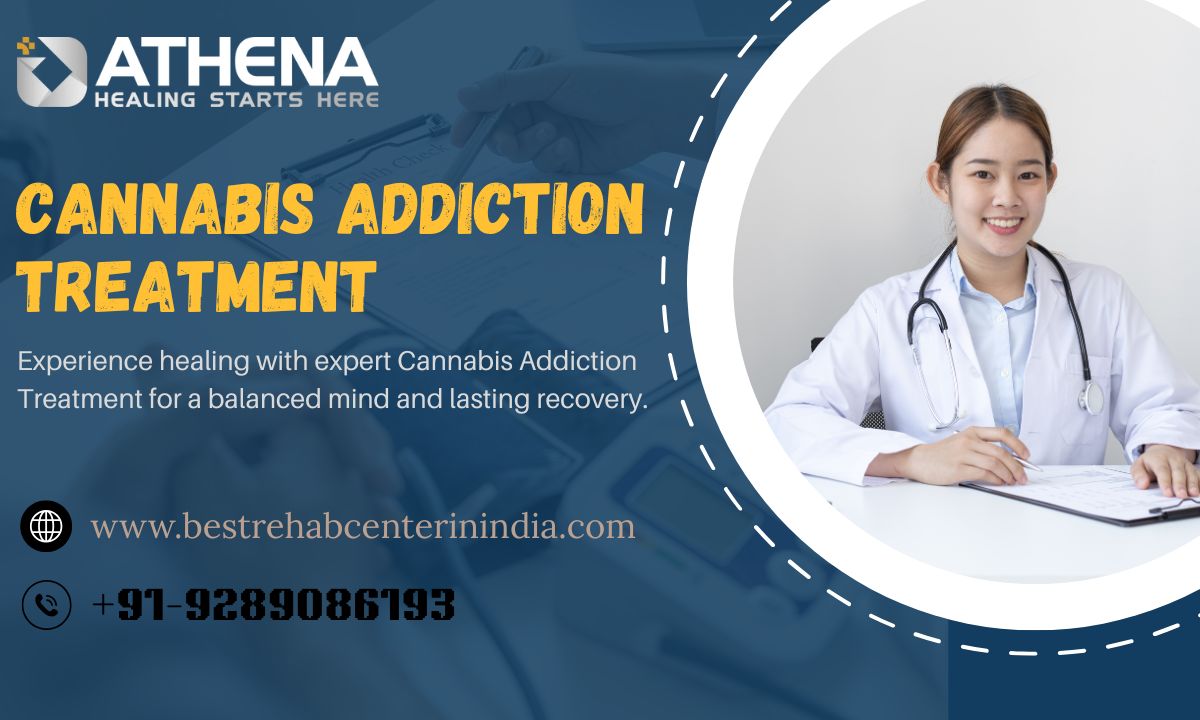Cannabis use has become increasingly common in India, especially among young adults and professionals seeking relaxation or recreational relief. Known by names such as ganja, herb, or Mary Jane, cannabis is often perceived as a harmless substance. However, consistent use can lead to emotional dependence, cognitive impairment, and physical health issues. The psychoactive compound THC alters mood, perception, and decision-making. Early professional Cannabis Addiction Treatment is essential to restore mental clarity, physical wellness, and long-term recovery.
Understanding Cannabis and Its Influence
Cannabis is a psychoactive plant derived from Cannabis sativa. While marijuana refers to dried leaves and flowers, and hashish is concentrated resin, cannabis generally contains higher THC levels, producing stronger psychoactive effects. THC interacts with cannabinoid receptors in the brain, inducing relaxation, euphoria, and altered perception. Long-term use may impair memory, focus, and emotional stability. Recognizing Cannabis Addiction Symptoms and Effects allows early detection and intervention, helping individuals avoid severe dependency.
Cultural and social acceptance of cannabis in some communities can obscure its risks. Misconceptions about its harmlessness often delay professional help, leading to mental, emotional, and physical complications. Awareness of its impact on mental health encourages timely treatment and recovery.
How Cannabis Leads to Dependence
THC’s Effect on the Brain
THC triggers the brain’s reward system by increasing dopamine levels, producing pleasurable sensations that reinforce repeated use. Over time, the brain adapts, creating tolerance and dependency. Users often need larger amounts to achieve the same effects, increasing the likelihood of Cannabis Use Disorder. Chronic exposure may alter brain pathways, affecting emotional regulation, stress response, and decision-making.
Emotional and Psychological Dependence
Cannabis is often used as a coping mechanism for stress, anxiety, or social pressures. This emotional reliance reinforces addictive behaviors and makes quitting challenging. Persistent cravings, irritability, and withdrawal from social interactions are common Cannabis Addiction Symptoms. Ignoring these psychological signs can exacerbate depression, anxiety, and low self-esteem, highlighting the importance of professional intervention.
Recognizing Cannabis Addiction Symptoms
Behavioral Signs
Behavioral symptoms of cannabis addiction include skipping responsibilities, secrecy about usage, and social withdrawal. Academic or work performance may decline, while personal relationships can become strained. Prioritizing cannabis use over life responsibilities is a clear indicator of addiction.
Psychological and Emotional Indicators
Psychological signs involve anxiety, mood swings, persistent cravings, low motivation, impaired memory, and poor decision-making. Emotional instability, irritability, and depressive symptoms often accompany these signs. Early recognition can prevent escalation and encourage seeking help from a De-addiction Centre in India.
Physical Symptoms
Long-term cannabis use may cause sleep disturbances, fatigue, appetite changes, weakened immunity, and lung-related issues. Chronic use can have severe consequences on physical health. Professional treatment ensures both emotional and physical recovery.
Understanding Cannabis Withdrawal Symptoms
Ceasing cannabis after prolonged use may result in Cannabis Withdrawal Symptoms, usually emerging 24–72 hours after stopping. Symptoms peak around the seventh day and gradually diminish over 15–20 days. Common withdrawal symptoms include insomnia, irritability, anxiety, mood swings, headaches, nausea, and reduced appetite. Effective management requires hydration, nutritious meals, maintaining a regular routine, and therapeutic support. Supervised programs at a Rehab Center for Cannabis Addiction ensure safe withdrawal, reducing relapse risk while supporting overall health.
Steps to Overcome Cannabis Addiction
Developing Self-Awareness and Goals
Recovery begins with self-awareness and goal-setting. Identifying triggers—such as social settings, stress, or habitual patterns—is essential. Tracking cannabis usage, noting personal motivations for quitting, and setting realistic short-term and long-term goals improves focus and commitment, enhancing chances of successful Cannabis Addiction Recovery.
Behavioral Therapy for Addiction
Professional Behavioral Therapy for Cannabis Addiction is critical to sustainable recovery. Cognitive Behavioral Therapy (CBT), Motivational Enhancement Therapy (MET), and Contingency Management (CM) help individuals understand triggers, manage cravings, and build coping strategies. Therapy also encourages self-reflection, emotional regulation, and adoption of healthier daily routines.
Family and Community Support
Family and social support are crucial in addiction recovery. Open communication, emotional encouragement, and motivation create a safe environment for patients during withdrawal and behavioral adjustment. Support groups allow sharing of experiences, accountability, and building a healthy social network, reinforcing sobriety and emotional stability.
Professional Cannabis Addiction Recovery
Medical and Psychological Care
Safe recovery begins with medically supervised detoxification and monitoring of physical health. Psychologists and psychiatrists provide comprehensive care to manage emotional imbalance, anxiety, or co-existing mental health issues. Medications may be prescribed to address withdrawal symptoms, insomnia, or anxiety. Supervised care at a Mental Health Hospital or Psychiatric Hospital for Mental Health Treatment ensures a thorough and structured recovery process.
Holistic Treatment Approach
Holistic therapies complement medical interventions. Yoga, meditation, mindfulness, regular exercise, and balanced nutrition promote emotional resilience, stress reduction, and overall wellness. Holistic care, integrated with professional treatment, helps restore both body and mind, enhancing recovery outcomes.
Rehabilitation and Aftercare
Sustainable recovery relies on structured rehabilitation programs and ongoing support. Individual therapy, group sessions, and follow-up care provide continuous guidance and reinforce relapse prevention strategies. Structured programs at a Rehab Center in India equip patients with practical tools and emotional support necessary for maintaining long-term sobriety.
Cannabis Addiction Treatment at Athena Behavioral Health
Athena Behavioral Health is a trusted Nasha Mukti Kendra and among the Best De-Addiction Centres for Cannabis Users in India. The center offers customized programs combining medical detox, behavioral therapy, and holistic interventions. Certified therapists, psychologists, and mental health professionals guide patients through Cannabis Addiction Recovery, ensuring safe and effective outcomes. Modern facilities, structured programs, mindfulness practices, and aftercare support help patients reintegrate into society while maintaining sobriety. Athena provides comprehensive Cannabis Addiction Treatment with compassionate guidance and professional care.
The Path to Mental and Physical Healing
Recovery from cannabis addiction is a gradual, structured journey that requires commitment, guidance, and consistent support. Prioritizing mental wellness, emotional balance, and social reintegration strengthens resilience and promotes long-term recovery. Patients are encouraged to practice mindfulness, engage in supportive communities, and maintain a healthy routine. Combining therapy, holistic care, and professional guidance ensures a stable, addiction-free life while improving productivity, relationships, and overall well-being.
Conclusion
Athena Behavioral Health is among the Best Luxury Rehab Center & Mental Hospital In Delhi, offering professional care, structured rehabilitation programs, and holistic healing approaches. Take the first step toward mental clarity, emotional balance, and long-lasting recovery today. Call +91-9289086193 to begin your journey to a healthier, addiction-free life.
Frequently Asked Questions (FAQs)
Q1: What is Cannabis Use Disorder?
A1: Cannabis Use Disorder (CUD) is a condition where repeated cannabis consumption leads to dependency, affecting emotional, mental, and physical health.
Q2: How long does cannabis rehab last?
A2: Duration varies based on severity, generally lasting 4–12 weeks, including detox, therapy, counseling, and aftercare support.
Q3: Can withdrawal symptoms be managed at home?
A3: Mild withdrawal may be managed with guidance, but professional care at a Rehab Center in India ensures safety and reduces relapse risk.
Q4: Which therapies are most effective for Cannabis Addiction Recovery?
A4: Cognitive Behavioral Therapy (CBT), Motivational Enhancement Therapy (MET), and Contingency Management (CM) are highly effective.
Q5: Why choose Athena Behavioral Health?
A5: Athena provides customized programs, certified therapists, holistic care, structured rehabilitation, and aftercare, making it one of the Nasha Mukti Kendra in India.







Leave a comment